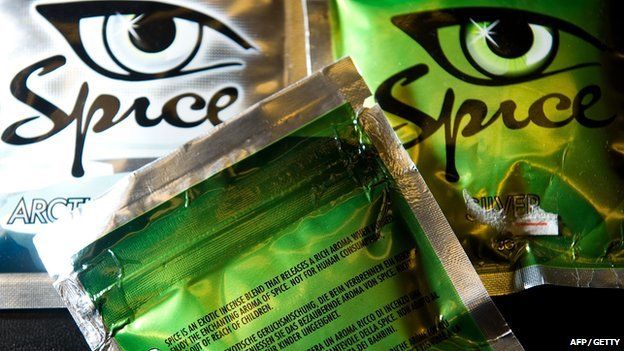'Legal highs' linked to a number of prison deaths
- Published

The use of so-called legal highs has been a factor in at least 19 prisoner deaths between 2012 and 2014, a new report has revealed.
The Prisons and Probations Ombudsman Nigel Newcomen said the substances were proving hard to detect and manage.
He said some inmates were thought to have been given "spiked" cigarettes by others wanting to test out new drugs.
A Prison Service spokesman said the substances "lead to violence and instability in our prisons".
Mr Newcomen's report has called for more training and education about the substances for both prisoners and prison staff.
The ombudsman examined 19 deaths in prison between April 2012 and September 2014 where the inmate was known, or strongly suspected, to have been taking new psychoactive substances (NPS).
'Violent behaviour'
The report focused on the substances known as "Spice" and "Black Mamba", which mimic the effects of cannabis.
Investigations revealed examples of "erratic, violent and out of character" behaviour by prisoners suspected to have used the drugs, while others were left incoherent and unable to stand up properly.
One prisoner became physically sick, behaved strangely, and then died of a heart attack later the same day, the report said.
There have also been reports of prisoners, including at least one of the men who died, being given "spiked" cigarettes by others who wanted to test new batches of NPS to gauge the effect before taking it themselves, the watchdog found.
In another case, a female prisoner took legal highs and became acutely mentally ill. She later died in hospital from self-inflicted injuries.
'Legal highs'
- Sold in a variety of forms including powder, pills, liquids, capsules and smoking mixtures. They can be smoked, snorted or swallowed
- The substances are often sold in "head shops" alongside drug paraphernalia
- Because they cannot be labelled as being for human consumption, they are often marketed as plant food, bath salts or incense
- There were 97 recorded deaths from legal highs in the UK in 2012, rising from 12 in 2009, according to figures from the Centre for Social Justice
- The independent think tank says the UK has the highest number of legal high users among young people in Europe
- They are not currently covered by the Misuse of Drugs Act 1971 because drugs are classified as illegal by their chemical compounds. The composition of legal highs is often slightly altered so that the ban is avoided.
BBC home affairs correspondent Danny Shaw said although the use of legal highs in prisons was frequently linked to rising levels of violence, this was the first time there had been an official figure for the number of deaths where legal highs may have been a factor.
A HM Inspectorate of Prisons report into Bristol prison published in February also cited seven "Spice-related emergency admissions to hospital" within six months.
Mr Newcomen said the use of the substances was a "source of increasing concern".
"As these substances are not allowed in prison, and also because they are difficult to test for, it is possible that there are additional cases of prisoners who had used such drugs before their death," he said.
"Trading of these substances in prison can also lead to debt, violence and intimidation... as well as adding to the security and control problems facing staff."
Charities have warned that legal highs are becoming the "drug of choice" because they are easy to buy.
The government has proposed a Psychoactive Substances Bill, which would ban "any substance intended for human consumption that is capable of producing a psychoactive effect" but critics say it could create illegal dealing networks and criminalise those who use herbal remedies.
A Prison Service spokesman added: "We take a zero tolerance approach to all drugs, with a range of robust search and security measures to detect them.
"We have already made it a criminal offence to throw drugs and other items over prison walls, and the government's new legislation will further strengthen our powers."
- Published26 May 2016
- Published22 June 2015
- Published17 January 2015
- Published25 November 2014
- Published12 February 2014